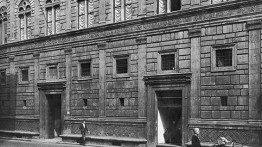Robert Gwathmey Chair Lecture | Peter Eisenman: The Becoming Unmotivated of the Sign
Tuesday, November 17, 2020, 2 - 4pm

Peter Eisenman: The Becoming Unmotivating of the Sign
Peter Eisenman, the Fall 2019 Robert Gwathmey Chair in Architecture and Art at The Cooper Union, is an internationally recognized architect and educator whose award-winning large-scale housing and urban design projects, innovative facilities for educational institutions, and series of inventive private houses attest to a career of excellence in design.
A roundtable with respondents Pier Vittorio Aureli, Preston Scott Cohen, Elisa Iturbe, Greg Lynn and Nader Tehrani as moderator will follow the lecture.
Prior to establishing a full-time architectural practice in 1980, Mr. Eisenman worked as an independent architect, educator, and theorist. In 1967, he founded the Institute for Architecture and Urban Studies (IAUS), an international think tank for architecture in New York, and served as its director until 1982.
Mr. Eisenman is a member of the American Academy of Arts and Sciences and the American Academy of Arts and Letters. Among other awards, in 2001 he received the Medal of Honor from the New York Chapter of the American Institute of Architects, and the Smithsonian Institution’s 2001 Cooper-Hewitt National Design Award in Architecture. He was awarded the Golden Lion for Lifetime Achievement at the 2004 Venice Architecture Biennale. Popular Science magazine named Mr. Eisenman one of the top five innovators of 2006 for the University of Phoenix Stadium for the Arizona Cardinals. In May 2010 Mr. Eisenman was honored with the Wolf Foundation Prize in the Arts, awarded in Jerusaleum. He is the recipient of the Gold Medal for Architecture by The American Academy of Arts and Letters in 2020.
Currently a Visiting Professor at the Yale School of Architecture, Mr. Eisenman’s academic career also includes teaching at Cambridge, Princeton, Harvard, and Ohio State universities. Previously he was the Irwin S. Chanin Distinguished Professor of Architecture at The Cooper Union, in New York City. He is also an author, whose most recent books include: Lateness (Princeton University Press, 2020), Written Into the Void: Selected Writings, 1990-2004 (Yale University Press, 2007), and Ten Canonical Buildings, 1950-2000 (Rizzoli, 2008), which examines in depth buildings by ten different architects.
Mr. Eisenman holds a Bachelor of Architecture degree from Cornell University, a Master of Science in Architecture degree from Columbia University, and M.A. and Ph.D. degrees from Cambridge University (U.K). He holds honorary Doctorates of Fine Arts from the University of Illinois, Chicago, the Pratt Institute in New York, and Syracuse University. In 2003, he was awarded an honorary Doctorate in Architecture by the Università La Sapienza in Rome.
Pier Vittorio Aureli is an architect and educator whose focuses on the relationship between architectural form, political theory and urban history. He is the author of The Possibility of an Absolute Architecture (2011) and The Project of Autonomy: Politics and Architecture Within and Against Architecture (2008).
Greg Lynn is the founder and principal of Greg Lynn FORM office in Los Angeles, and a Professor at the University of Applied Arts in Vienna, as well as a Professor at the UCLA School of the Arts and Architecture. He is CEO and co-Founder of the Boston based robotics company Piaggio Fast Forward.
Preston Scott Cohen is a Professor of Architecture at the Harvard Graduate School of Design (GSD) and the Design Principal of Preston Scott Cohen, Inc. based in Cambridge, MA. He is the author of Lightfall (Skira Rizzoli, 2016), The Return of Nature (2015) and Contested Symmetries (2001).
Elisa Iturbe is a Critic at the Yale University School of Architecture and an Adjunct Assistant Professor at The Cooper Union. She is the editor of Log 47, titled Overcoming Carbon Form, and co-author with Peter Eisenman of Lateness (2020).
The Robert Gwathmey Chair, a rotating professorship in art and architecture, was established by Charles Gwathmey in 1993, in honor of his father, Robert Gwathmey, a professor of art at The Cooper Union from 1942 to 1968. This position has previously been held by Bill T. Jones, Norman Bryson, Peter Eisenman, Victor Burgin, Maya Lin, Vito Acconci, Hans Haacke, Michael Webb, Thomas Hirschhorn, and Torkwase Dyson.
This event is free and accessible to the public.
View the full Fall 2020 Lectures and Events List.




